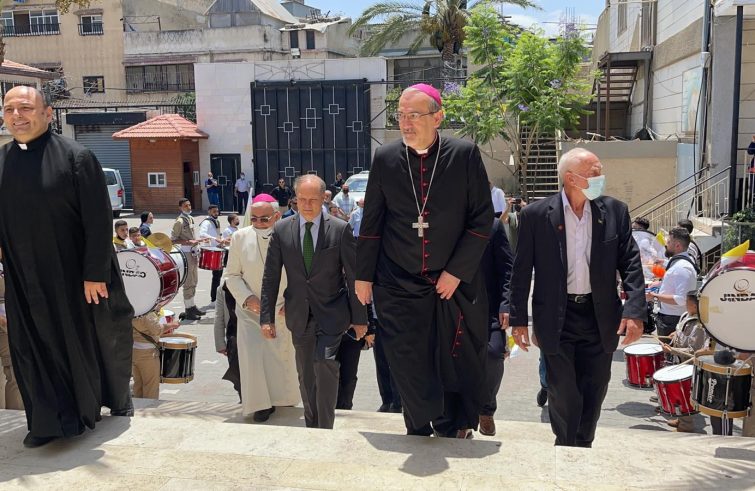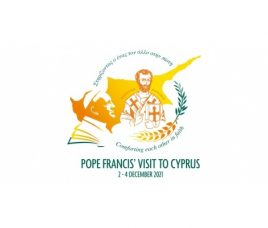
“The Church in Cyprus is a multicultural, creative and multi-coloured reality. The local Catholic community is smaller than the total number of migrants who have settled on the island. It’s a vibrant Church, also thanks to the commitment of lay people and the presence of migrants, who will draw great comfort and encouragement from the Pope’s visit”:
 The Latin Patriarch of Jerusalem, Msgr. Pierbattista Pizzaballa, is currently in Cyprus where he will welcome Pope Francis upon his arrival. This will be the second papal visit to Cyprus – whose Latin Church is under the Jurisdiction of the Latin Patriarchate of Jerusalem – in just over ten years. The first visit was by Pope Benedict XVI in June 2010. Pope Francis will be welcomed by the Latin Patriarch who described to SIR the atmosphere of anticipation on the island, but more importantly the message that the Catholic and the Cypriot Christian community wish to send out to the universal Church and, why not, to the whole of Europe. Cyprus is an EU member country since 2004, although divided in two, since the Turkish-controlled part of the island since 1974 (called the Turkish Republic of Northern Cyprus) is only recognised by Ankara’s government. “Cyprus is an island divided by a wall and thus a wounded land – Msgr. Pizzaballa told SIR – the Wall that runs through it is a reminder that we should not delude ourselves, as the road to reunification is still long, with deep divisions that will take a long time to heal. Reconciliation is a long-term vision that requires courage and steadfast faith”, which will be further strengthened by the Pope’s presence. In addition to the “yearning for reunification”, the Cypriot Church also wishes to highlight the soundness of its ecumenical journey. The Latin Patriarch explained: “Relations between the local Catholic Church and the Orthodox Church are excellent. The Orthodox Church has offered the use of several churches to Catholics for their religious celebrations. As mentioned earlier, Cyprus is an island marked by hurts, tensions and divisions, mirroring situations in the Middle East, but without causing tensions or polarisation.”
The Latin Patriarch of Jerusalem, Msgr. Pierbattista Pizzaballa, is currently in Cyprus where he will welcome Pope Francis upon his arrival. This will be the second papal visit to Cyprus – whose Latin Church is under the Jurisdiction of the Latin Patriarchate of Jerusalem – in just over ten years. The first visit was by Pope Benedict XVI in June 2010. Pope Francis will be welcomed by the Latin Patriarch who described to SIR the atmosphere of anticipation on the island, but more importantly the message that the Catholic and the Cypriot Christian community wish to send out to the universal Church and, why not, to the whole of Europe. Cyprus is an EU member country since 2004, although divided in two, since the Turkish-controlled part of the island since 1974 (called the Turkish Republic of Northern Cyprus) is only recognised by Ankara’s government. “Cyprus is an island divided by a wall and thus a wounded land – Msgr. Pizzaballa told SIR – the Wall that runs through it is a reminder that we should not delude ourselves, as the road to reunification is still long, with deep divisions that will take a long time to heal. Reconciliation is a long-term vision that requires courage and steadfast faith”, which will be further strengthened by the Pope’s presence. In addition to the “yearning for reunification”, the Cypriot Church also wishes to highlight the soundness of its ecumenical journey. The Latin Patriarch explained: “Relations between the local Catholic Church and the Orthodox Church are excellent. The Orthodox Church has offered the use of several churches to Catholics for their religious celebrations. As mentioned earlier, Cyprus is an island marked by hurts, tensions and divisions, mirroring situations in the Middle East, but without causing tensions or polarisation.”
 A laboratory of coexistence. A Church that is a laboratory of coexistence and dialogue implemented also in the social and charitable spheres.
A laboratory of coexistence. A Church that is a laboratory of coexistence and dialogue implemented also in the social and charitable spheres.
Pope Francis has often referred to the Church as a ‘field hospital’,” the Latin Patriarch said. “The Cypriot Church is a Church that rolls up her sleeves and gets things done.”
This is evidenced also in numerical terms. According to Caritas Internationalis, “Owing to regional developments and the broader migration crisis that started in 2015, Caritas Cyprus experienced a dramatic increase in requests for assistance from refugees and asylum seekers”, they explain. Caritas Cyprus is one of the few local humanitarian organisations providing direct support to refugees and asylum seekers. Approximately 99% of persons served by Caritas Cyprus are currently of migrant origin. Caritas Cyprus registered approximately 2,300 new beneficiaries in 2019 and 2020. These numbers continued increasing, with as many as 1500 in the first half of 2021. A total of 3,822 families from 66 different countries have been assisted in 2020.” A glimmer of hope is thus brought to the poor and to people at the margins of Cypriot society. “In the Church, we often think of the structures, what should be done and what should be built,” adds the Latin Patriarch. “In Paphos, there is a parish that has absolutely nothing, no church, no rectory, and yet it functions very well as a parish, thanks to the lay faithful and to the help of the Orthodox Church. There are few priests here and the faithful are in the forefront in helping out.” The presence of so many migrants, Pizzaballa points out, “reminds us that migration is not a temporary or episodic phenomenon, but a global one requiring global responses, also in pastoral terms. Hence migrants must be regarded as an integrating part and a resource in the life of the Church. In Cyprus this is a fact.”
Message to Europe. “The forthcoming papal visit to Cyprus and Greece, two countries bordering on the Mediterranean Sea” – says the Latin Patriarch – “sends out a message to Europe. Whatever happens in this sea will play a decisive role for the Old Continent. I am thinking of the energy issue, of the intersection between East and West with its many implications, of migrants from the Middle East and Africa…all these situations are strongly felt here and are bound to reach Europe. Cyprus has always been a gateway for the East to the West, and vice versa. Here the wounds and the events that will eventually affect both sides of the Mare Nostrum are instantly visible. The long-term fruits of this visit will be seen in Florence at the end of February when the bishops of the Mediterranean and the mayors of the largest cities bordering it will gather – following the previous meeting in Bari.”
Thoughts go to Bethlehem. The Latin Patriarch brought with him from Jerusalem a handcrafted icon of St Barnabas, made by Christian artisans in Bethlehem: it is a gift for Pope Francis. “The fact that local Christians have had this thought at a particularly difficult time for Bethlehem is a very beautiful thing,” he said. The icon serves as a reminder that Christmas is coming soon and there will be no pilgrims there to celebrate it. The latest restrictions enforced in Israel due to the Omicron variant of Covid-19 are dampening any remaining hope of a resumption of pilgrimages, at least for now. In Cyprus we will also pray for the Holy Land.”









